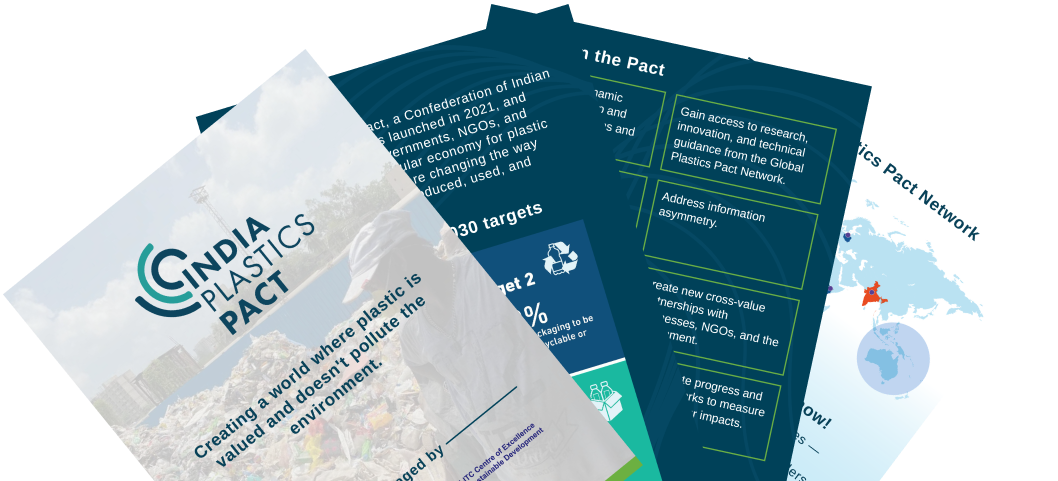What is the India Plastics Pact?
The India Plastics Pact, a Confederation of Indian Industry initiative, launched in September 2021, unites businesses, governments, NGOs, and citizens to create a circular plastics economy in India. The CII-ITC Centre of Excellence for Sustainable Development (CESD) anchors the India Plastics Pact, within CII. The India Plastics Pact’s vision is to create a world where plastic is valued and doesn’t pollute the environment. The Pact focuses on addressing the barriers to circularity in the plastic packaging sector through four ambitious time-bound targets.
Since its launch, India Plastics Pact signatories have received technical support from WRAP, a global environmental action NGO based in the UK. The Pact is the first of its kind in Asia and is part of the Global Plastics Pact Network, convened by the Ellen MacArthur Foundation and WRAP.
India Plastics Pact’s targets for 2030

Define a list of unnecessary or problematic plastic packaging and items and take measures to address them through redesign and innovation

100%
of plastic packaging to be reusable, recyclable or compostable*

50%
of plastic packaging to be effectively recycled

25%
average recycled content across all plastic packaging
*These would only include compostable plastics with all the following properties
-
a. do not leave any microplastic residue,
-
b. used in closed-loop and controlled systems with sufficient infrastructure available or fit-for-purpose applications, and,
-
c. properly labelled as ‘Home’ or ‘Industrial’ compostable.
For target-wise progress since the Pact’s launch, read India Plastics Pact Annual Report 2024-25.








About the Confederation of Indian Industry
The Confederation of Indian Industry (CII) works to create and sustain an environment conducive to the development of India, partnering Industry, Government and civil society through advisory and consultative processes.
For 130 years, CII has been engaged in shaping India's development journey and works proactively on transforming Indian Industry's engagement in national development. With its extensive network across the country and the world, CII serves as a reference point for Indian industry and the international business community.
In the journey of India's economic resurgence, CII facilitates the multifaceted contributions of the Indian Industry, charting a path towards a prosperous and sustainable future. With this backdrop, CII has identified "Accelerating Competitiveness: Globalization, Inclusivity, Sustainability, Trust" as its theme for 2025-26, prioritizing five key pillars. During the year, CII will align its initiatives to drive strategic action aimed at enhancing India's competitiveness by promoting global engagement, inclusive growth, sustainable practices, and a foundation of trust.
Confederation of Indian Industry
The Mantosh Sondhi Centre, 23, Institutional Area, Lodi Road, New Delhi – 110 003 (India)
Email: info@cii.in
Website: https://www.cii.in/
CII-ITC Centre of Excellence for Sustainable Development
The CII-ITC Centre of Excellence for Sustainable Development (CESD) is the ecosystem creator for sustainable development in India. As a 20-year-old Industry-led institution within CII, the Centre drives sustainable, environmental, inclusive and climate-friendly transformation among stakeholders through research, data-driven digital tools, frameworks, collaborative initiatives and capacity development.
CESD works towards bringing local and global macro challenges to the centre stage; building policy consensus on critical issues; strengthening stakeholders' awareness and representation on policy & regulatory reforms and enabling actions that positively impact the environment, nature and communities.
With a vision to drive transformation towards sustainable development, CESD continues to play a focal role in Government-Industry dialogues on national regulations; articulating stakeholders' discourse on global policies; putting forth Indian Industry's stand on macro-economic issues and accentuating the need for sustainable and inclusive transformation.
CESD focuses on six transformational pathways: Advancing Creation of a Circular Economy; Facilitating an Enabling Ecosystem for ESG Reporting; Accelerating Nature Positive Actions; Enhancing Solutions for Clean Air; Building Climate Resilience and Low-Carbon Economy and Fostering Dialogues, Engagements & Knowledge Exchange.
Confederation of Indian Industry
3rd floor, Andhra Association Building 24,25 Institutional Area, Lodi Road New Delhi - 110 003
Email: cesd@cii.in
Website: https://sustainabledevelopment.in

